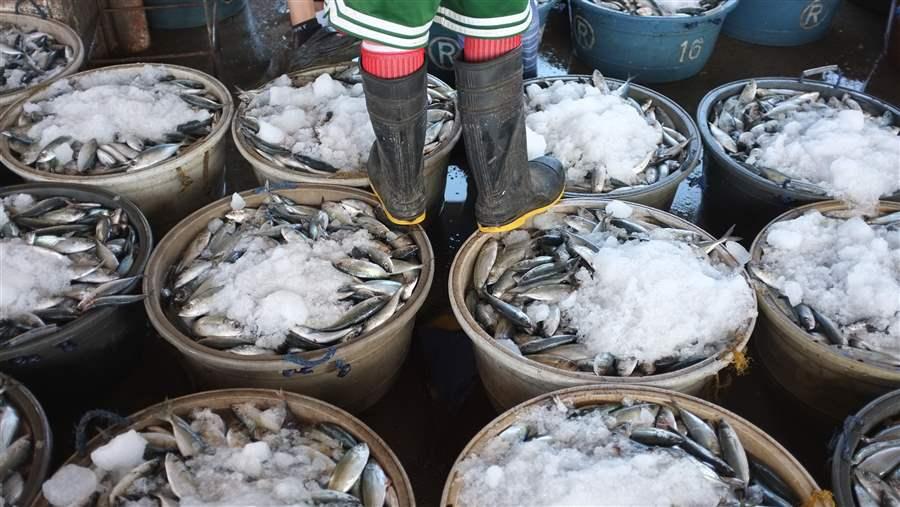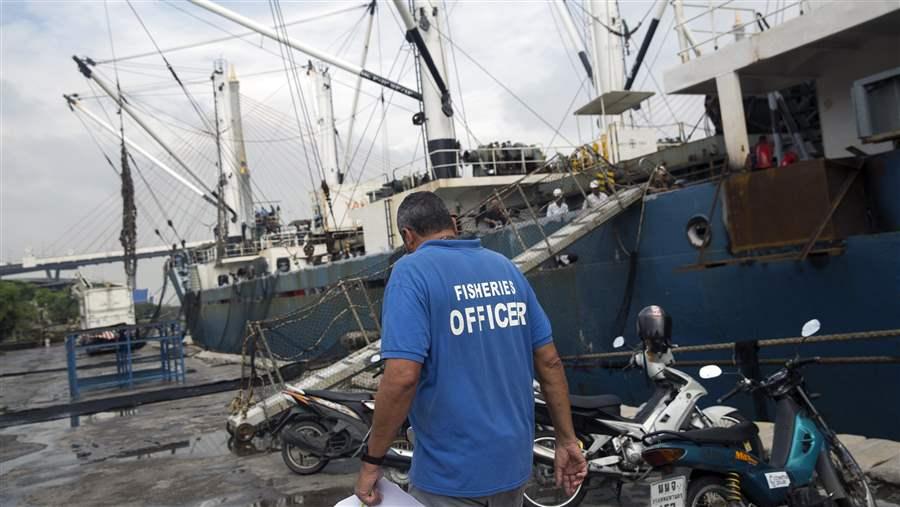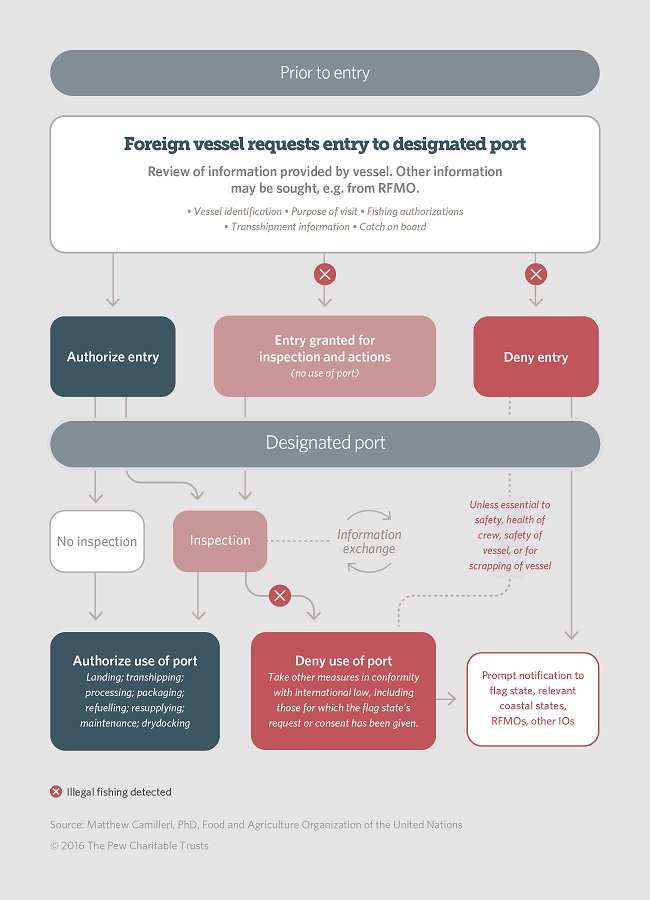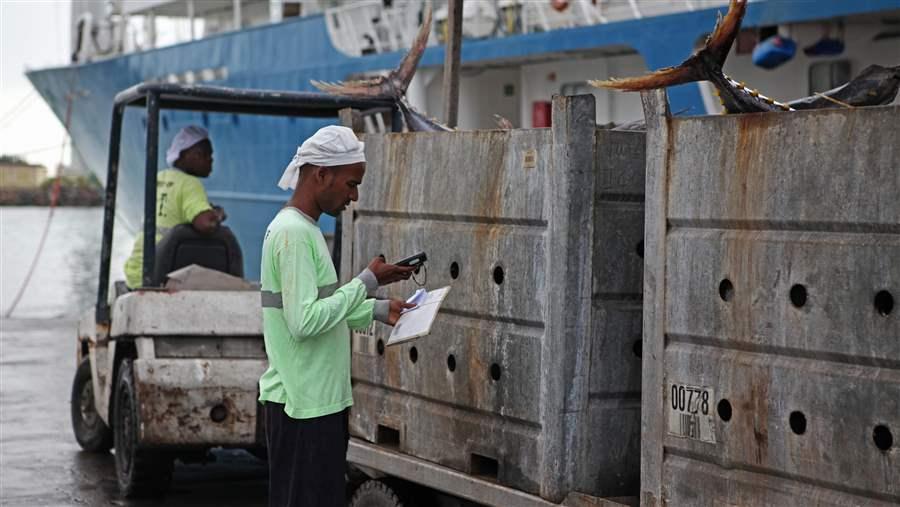Port State Measures Agreement: Why Seafood Buyers Should Help
Overview
Each year, up to 26 million tons of fish are stolen from our seas. That’s 1 in every 5 fish sold at market. Illegal, unreported, and unregulated (IUU) fishing is a major threat to the world’s oceans, depleting already dwindling fish populations and threatening the economies and food security of communities that rely on fish.
Eliminating IUU fishing is becoming a priority for international seafood buyers. Industry players realize that this practice threatens the sustainability of the seafood their customers demand and robs legitimate fishers of income.
Ports of landing have traditionally been a weak point in the global fight against IUU seafood, but this is changing. By supporting strong port controls, the seafood industry can give assurance that it is not inadvertently contributing to illegal fishing.
How port controls help combat IUU fishing
IUU fishers rely on a range of tactics and loopholes in national law and procedures to get their product to market. Ports known for lax law enforcement or limited inspections are a prime pathway for illegally caught seafood to enter the supply chain. Regulations governing which ships can enter and use ports, and proper inspections when vessels first land or transship fish, known as port controls, are critical to preventing illegal operators from getting their catch from ship to shelf.
The key instrument in ensuring adequate port controls is the 2009 Food and Agriculture Organization of the United Nations Agreement on Port State Measures to Prevent, Deter, and Eliminate Illegal, Unreported, and Unregulated Fishing—known as the Port State Measures Agreement or PSMA. The pact came into force in June 2016, when more than 25 parties had joined it. It is the first internationally binding treaty aimed at combating IUU fishing.
The PSMA requires countries to exert greater controls on foreign-flagged vessels seeking to enter and use their ports. Operators must submit a request to authorities in these States when they want to land or transship catch. The authorities may refuse entry to vessels known to have engaged in illegal fishing, or immediately inspect them and block their access to port services.
By supporting strong port controls, the seafood industry can give assurance that it is not inadvertently contributing to illegal fishing.
The results of these inspections are communicated to other relevant States and organizations to facilitate cooperation in enforcement actions. While the PSMA focuses on foreign-flagged vessels, parties to the agreement are expected to bolster port controls overall, including on domestic vessels. If they follow through, operators who fish illegally will have much less incentive to continue their activities—and their catch will not enter the world market.
The number of parties to the PSMA continues to grow, and the agreement is proving to be a cost-effective tool for combating illegal fishing globally. This is especially relevant because conventional methods of enforcement are prohibitively expensive and require extensive labour. States that join the treaty are sending a clear signal to the international community that they are dedicated to fighting illegal fishing and that their ports are no longer open to illegal seafood.
States that join the treaty are sending a clear signal to the international community that they are dedicated to fighting illegal fishing and that their ports are no longer open to illegal seafood.
How industry can help
Seafood buyers can show a preference for ports in States that are party to the PSMA, as these are associated with a lower level of risk of being entry points for illegal catch. And if their supply chain includes ports in States that have not yet joined the treaty, buyers can play an active role in advocating for them to do so.
Application of all PSMA requirements is a critical part of fighting IUU fishing. When buyers conduct due diligence, their risk assessment criteria should include whether the port State has procedures to identify suspicious vessels and block them from its ports, standards for port inspections and the capacity to carry them out, and channels to share information with other regional and international agencies.
Seafood buyers should also consider working with suppliers to improve the implementation of port State measures by:
- Mapping supply chains to understand the ports of landing and transshipment.
- Checking whether ports are in States that have signed the PSMA and, if not, advocating for those States to join.
- Checking whether States have officially designated ports for landing and transshipment by foreign-flagged vessels and, if not, advocating for their inclusion in the list of designated ports.
- Encouraging State parties to take an active role in the implementation of the PSMA by participating in meetings, working groups, and other international and regional forums, including those that deal with developing States’ requirements.
- Inquiring about the implementation of port State measures during port visits and using a standardized list of questions.
A Port State’s Role in Curbing Illegal Fishing
- The vessel master seeking to enter port must, sufficiently in advance and in accordance with the port State’s requirements, provide the fisheries authority with information including the identity of the vessel, the catch on board, fishing and transshipment authorizations, and details of any transshipments that have taken place.
- Port officials decide whether to authorize or deny the vessel’s entry into port, taking into account the vessel’s report and all other available information to determine whether it might have been involved in IUU fishing or fishing-related activities in support of IUU fishing. If the vessel is allowed into port, it is then subject to the port State’s jurisdiction.
- If there is sufficient evidence that the vessel has been involved in or supported IUU fishing, the port State can either refuse the vessel entry into port or allow entry exclusively for the purpose of inspecting the vessel and taking other appropriate actions. Any such vessel entering into port must be denied port use for landing, transshipping, packaging, and processing of fish, and for other port services including refuelling and resupplying, maintenance, and dry-docking.
- If a vessel enters into port and there are reasonable grounds to believe that the vessel has been involved in IUU fishing, it must be refused permission to land or transship its catch, and to use the port’s services.
- A vessel must be refused permission to land or transship its catch and use the port’s services if the port State finds that the vessel does not have a valid authorization from the flag State or the coastal State to engage in fishing or fishing-related activities, the port State receives evidence that fish on board was taken in contravention of coastal State requirements, or the flag State does not confirm within a reasonable period of time that fish on board was taken in accordance with requirements of regional fisheries management organizations (RFMOs).
- A vessel must not be denied use of port services if the safety of the crew or the vessel, or the health of the crew, is at risk.
- The port State may take other measures, including actions in consultation or cooperation with the flag State and, if appropriate, coastal States and RFMOs.
- The port State must transmit inspection reports and information on measures taken following inspection to the flag State and, as appropriate, other relevant States, RFMOs, the Food and Agriculture Organization, and other relevant international organizations.
Conclusion
Seafood buyers have an important role in determining how effective the Port State Measures Agreement will be in eliminating illegal fishing. While more governments must ratify and implement the agreement, buyers can raise awareness of problems that should be addressed and advocate for the treaty’s effective application.
By working collaboratively with governments and intergovernmental and non-governmental organizations, seafood buyers can help tackle illegal fishing from all angles. They have a strong incentive: Consumers are becoming increasingly aware of how their seafood is sourced, prompting buyers to take the necessary steps to assure their customers that their products are sustainable.
By asking questions and advocating for improvements in the ports where their seafood is landed, seafood buyers can reduce their risk of trading in IUU seafood and limit the number of ports where fishers can offload their illegal catch.












